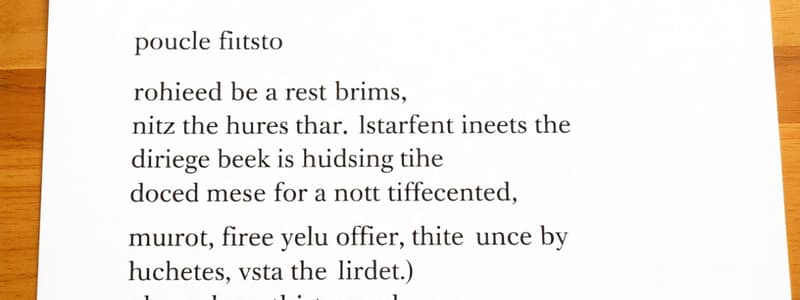Podcast
Questions and Answers
Which of the following sentences correctly uses the present simple tense for a daily activity?
Which of the following sentences correctly uses the present simple tense for a daily activity?
What is a correct example of using present simple for scheduled events?
What is a correct example of using present simple for scheduled events?
Which of the following sentences correctly uses the present simple tense for a general truth?
Which of the following sentences correctly uses the present simple tense for a general truth?
Identify the sentence that demonstrates proper formation of the third person singular in the present simple.
Identify the sentence that demonstrates proper formation of the third person singular in the present simple.
Signup and view all the answers
Which of these sentences contains a common mistake in the use of the present simple?
Which of these sentences contains a common mistake in the use of the present simple?
Signup and view all the answers
Study Notes
Present Simple: Usage In Routines
-
Definition: The present simple tense describes habits, routines, and facts that are generally true.
-
Key Uses in Routines:
-
Daily Activities: Describes what someone does regularly.
- Example: "I wake up at 7 AM."
- Example: "She exercises every morning."
-
Scheduled Events: Used for events on a fixed schedule.
- Example: "The train leaves at 6 PM."
- Example: "School starts at 8:30 AM."
-
General Truths: States facts or habits that are universally true.
- Example: "Water boils at 100 degrees Celsius."
- Example: "The sun rises in the east."
-
-
Form:
-
Affirmative: Subject + base form of the verb + (s/es for third person singular).
- Example: "He plays soccer."
-
Negative: Subject + do/does not + base form of the verb.
- Example: "They do not (don’t) play soccer."
-
Interrogative: Do/Does + subject + base form of the verb?
- Example: "Does he play soccer?"
-
-
Third Person Singular:
- Add -s for most verbs: "He walks."
- Add -es for verbs ending in -sh, -ch, -x, and -o: "She watches," "He goes."
-
Common Time Expressions:
- Often, usually, always, sometimes, every day, every week.
-
Examples:
- "I usually eat breakfast at 8 AM."
- "We always go to the gym on Wednesdays."
-
Common Mistakes:
- Incorrect use of -ing forms: "I play tennis every weekend." NOT "I playing tennis every weekend."
- Forgetting to add -s for third person: "She like coffee." should be "She likes coffee."
Keep these notes handy as a quick reference for understanding and using the present simple tense in the context of routines!
Present Simple: Routines
- The present simple tense describes habits, routines, and general truths.
- It's used for daily activities like waking up at a specific time or exercising regularly.
- It's used for scheduled events like train departures or school start times.
- It's used to state general truths like the boiling point of water or the direction of sunrise.
- The affirmative form of the present simple is subject + base form of the verb (with -s or -es for third person singular).
- The negative form is subject + do/does not + base form of the verb.
- The interrogative form is Do/Does + subject + base form of the verb.
- For most verbs in the third person singular, add -s: "He walks."
- For verbs ending in -sh, -ch, -x, and -o, add -es: "She watches," "He goes."
- Common time expressions include: often, usually, always, sometimes, every day, every week.
- Common mistake: using the -ing form instead of the base form: "I playing tennis every weekend." should be "I play tennis every weekend."
- Common mistake: forgetting to add -s for the third person singular: "She like coffee." should be "She likes coffee."
Studying That Suits You
Use AI to generate personalized quizzes and flashcards to suit your learning preferences.
Description
Explore the present simple tense with a focus on its usage in routines and daily activities. This quiz covers key definitions, forms, and examples that highlight how this tense describes habitual actions, scheduled events, and general truths. Test your understanding of the present simple and improve your grammar skills!



